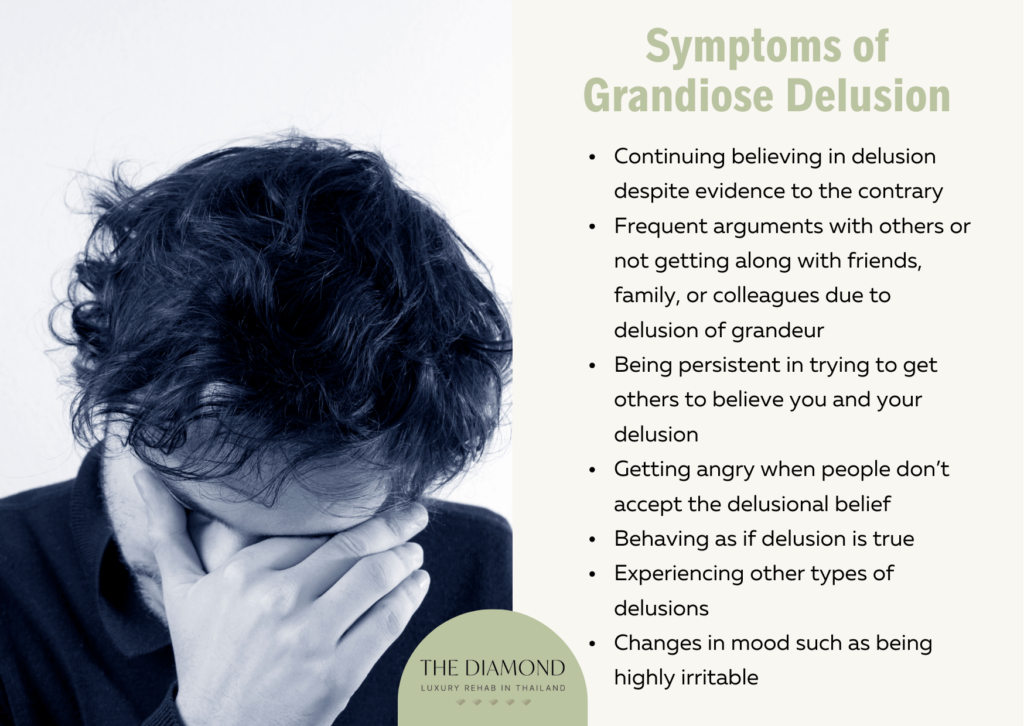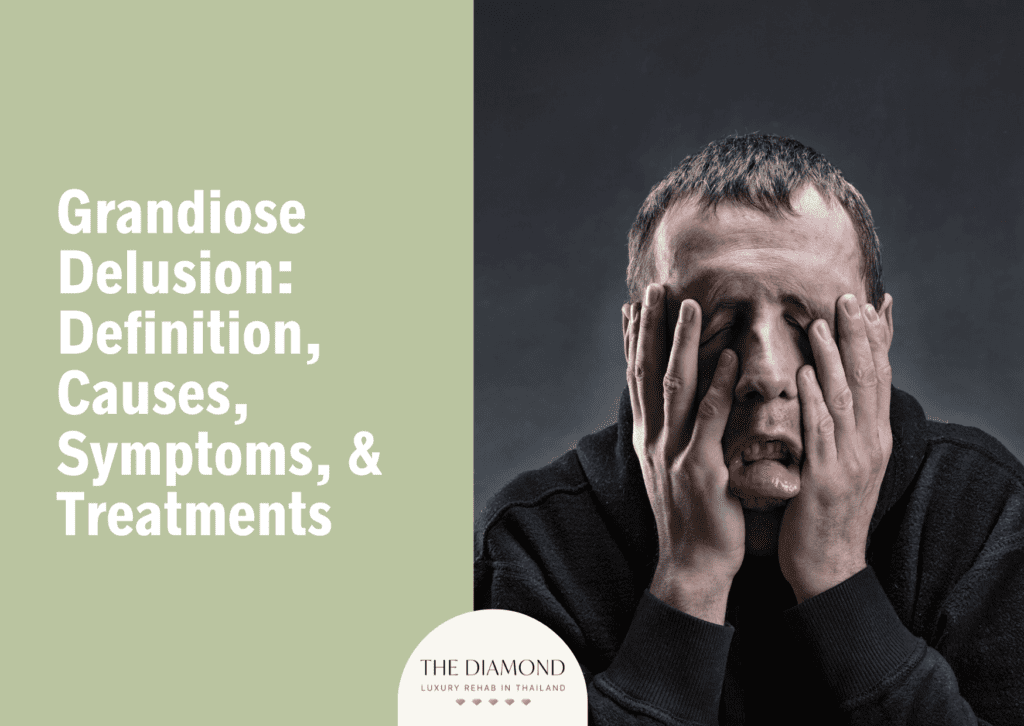Delusions of grandeur are false beliefs of superiority. These can impact daily life.
Understanding these delusions is crucial for effective management and treatment. Delusions of grandeur often make individuals believe they have exceptional abilities or importance. These beliefs are not based on reality and can be quite disruptive. Knowing the symptoms helps in early identification and proper diagnosis.
Recognizing these delusions allows for timely intervention. Treatment typically involves a combination of therapy and medication. Addressing these delusions is key to improving the quality of life for those affected. This blog post will guide you through the symptoms, diagnosis, and treatment of delusions of grandeur. Understanding these aspects can help in managing and supporting individuals with this condition effectively.

Credit: diamondrehabthailand.com
Delusions Of Grandeur Explained
Delusions of grandeur are false beliefs of one's importance and power. These beliefs can significantly impact a person's life. Often, individuals feel they have special abilities or connections. Understanding these delusions is crucial for proper treatment.
Common Characteristics
People with delusions of grandeur exhibit specific traits. These traits include:
- Exaggerated self-esteem
- Belief in having unique talents
- Feeling superior to others
- Thinking they have special relationships with famous people
- Believing they are destined for greatness
These characteristics can vary in intensity. Some may seem harmless, while others disrupt daily life. Recognizing these signs early can help in managing the condition effectively.
Types Of Delusions
There are different types of delusions of grandeur. Each type has distinct features:
| Type | Description |
|---|---|
| Religious Delusions | Believing one has a special connection with a deity |
| Identity Delusions | Thinking one is a famous person, like a celebrity |
| Power Delusions | Feeling one has extraordinary abilities or influence |
Understanding these types helps in identifying the specific delusions a person might have. This understanding is essential for accurate diagnosis and treatment.

Credit: diamondrehabthailand.com
Identifying Symptoms
Delusions of grandeur are false beliefs of one's own importance. These beliefs can affect a person’s daily life. Identifying the symptoms early can help in managing the condition. Understanding the symptoms is the first step.
Psychological Indicators
People with delusions of grandeur often have an inflated sense of self-worth. They may believe they have special powers. These powers might be supernatural or beyond human abilities. Some think they have a unique talent. Others might believe they are famous or destined for greatness.
Another sign is the strong belief in having a special relationship. This could be with a famous person or a higher power. These beliefs are persistent. They remain even when proven false.
Behavioral Signs
Behavioral signs are easier to notice. Individuals may act superior. They might demand special treatment. Their actions often reflect their inflated self-view. They may speak about their "special" status often.
In social settings, they might dominate conversations. Interrupting others becomes common. They might also show little interest in others' opinions. Their focus is often on their own grand ideas. They might isolate themselves. This happens if they feel others do not understand their "greatness".
Causes And Risk Factors
Delusions of grandeur are a common symptom in various mental health disorders. Understanding the causes and risk factors can help manage this condition better. This section will discuss the genetic influences and environmental triggers that contribute to delusions of grandeur.
Genetic Influences
Genetic factors play a significant role in the development of delusions of grandeur. Studies show that mental health disorders often run in families. If a close family member has a mental health disorder, you may be at higher risk. Genes can affect brain chemistry, influencing thoughts and behaviors. Certain genetic mutations may increase vulnerability to delusions.
Environmental Triggers
Environmental factors also contribute to delusions of grandeur. Stressful life events can trigger these delusions. Trauma, such as abuse or neglect, impacts mental health. Substance abuse can alter brain function and lead to delusions. Social isolation and lack of support may worsen symptoms. Early intervention and support are crucial in managing these triggers.
Diagnostic Criteria
Delusions of grandeur often present as an exaggerated sense of importance. Understanding the diagnostic criteria is crucial for proper identification and treatment.
Doctors use specific guidelines to diagnose this condition. They look for certain symptoms and behaviors. Let's explore these criteria in more detail.
Clinical Assessment
A clinical assessment involves a detailed interview. The doctor asks about the patient's thoughts and beliefs. They also observe behavior and interaction with others.
Doctors may use standardized questionnaires. These help to identify patterns of delusional thinking. The assessment process is thorough to ensure accuracy.
Differential Diagnosis
Differential diagnosis helps distinguish delusions of grandeur from other mental health issues. Doctors compare symptoms with conditions like schizophrenia or bipolar disorder.
They rule out medical conditions that could cause similar symptoms. This might include brain injuries or substance abuse. Accurate diagnosis is key for effective treatment.
Treatment Options
Delusions of grandeur are a complex mental health issue. Treating these delusions requires a multifaceted approach. Below, we discuss the treatment options available for those experiencing delusions of grandeur.
Medications
Medications play a key role in managing delusions of grandeur. Antipsychotic drugs are often prescribed. These medications help reduce psychotic symptoms.
Common antipsychotics include:
- Risperidone
- Olanzapine
- Quetiapine
In some cases, mood stabilizers are used. They help manage mood swings. Examples are:
- Lithium
- Valproate
Antidepressants may also be helpful. They treat underlying depression or anxiety.
Psychotherapy
Psychotherapy is another essential treatment. Cognitive Behavioral Therapy (CBT) is often used. CBT helps patients challenge and change their delusional thoughts.
Therapists may use other methods as well, such as:
- Supportive Therapy: Provides emotional support.
- Insight Therapy: Helps patients understand their condition.
Group therapy can also be beneficial. It allows patients to share their experiences. This can reduce feelings of isolation.
Family therapy is important, too. It helps family members understand the condition. They learn how to support their loved one.
Coping Strategies
Dealing with delusions of grandeur can be challenging. Effective coping strategies can help manage symptoms and improve quality of life. This section will explore key coping strategies, including building support networks and employing self-help techniques.
Support Networks
Having a strong support network is vital. It can provide emotional stability and practical help. Here are some ways to build your support network:
- Family and Friends: Keep open communication with loved ones. They can offer understanding and reassurance.
- Support Groups: Join groups where you can share experiences and gain advice. Connecting with others facing similar challenges can be empowering.
- Healthcare Providers: Regular appointments with your doctor or therapist can help monitor your progress and adjust treatments as needed.
Self-help Techniques
Self-help techniques can empower you to take control of your mental health. Consider these methods:
- Mindfulness: Practice mindfulness meditation to stay grounded in the present moment. It can reduce stress and improve focus.
- Journaling: Write down your thoughts and feelings. Journaling can help you process emotions and recognize patterns in your thinking.
- Exercise: Regular physical activity boosts mood and energy levels. Even a short daily walk can make a difference.
Incorporating these coping strategies into your daily routine can lead to significant improvements. Remember, consistent effort and support are key to managing delusions of grandeur effectively.
Impact On Daily Life
Delusions of grandeur can have a profound impact on daily life. People with this condition often believe they have exceptional abilities or importance. These beliefs can affect their relationships, work, and overall productivity.
Relationships
Delusions of grandeur can strain personal relationships. A person may think they are superior to others. This belief can cause conflicts with friends and family. Loved ones may feel neglected or undervalued. They may also struggle to understand the person’s behavior. Trust issues can arise, leading to further isolation.
Work And Productivity
At work, delusions of grandeur can lead to unrealistic goals. An individual may overestimate their abilities and take on too much. This can result in missed deadlines and incomplete tasks. Colleagues may find it hard to cooperate with them. The workplace environment can become tense and unproductive. The person’s professional reputation can suffer, affecting their career growth.
Case Studies
Delusions of grandeur often leave a profound impact on those experiencing them. To better understand this condition, it's essential to explore real-life examples and the lessons learned from them. These case studies provide valuable insights into the symptoms, diagnosis, and treatment of this condition.
Real-life Examples
Consider John, a 35-year-old man who believed he was a famous rock star. He started dressing like a musician and attempted to book concerts. His family was concerned and sought medical help. Another case involves Mary, a 50-year-old woman who thought she had a direct line to world leaders. She often wrote letters to them, offering advice on global issues.
Both John and Mary exhibited classic symptoms. They had an inflated sense of their abilities and importance. These symptoms disrupted their daily lives and relationships. Professional intervention was necessary.
Lessons Learned
These cases highlight the importance of early diagnosis. Family members and friends play a crucial role. They often notice the first signs of delusions. Seeking help early can lead to better outcomes.
- Early Intervention: Identifying symptoms early can prevent escalation.
- Support System: Family support is vital for recovery.
- Professional Help: Therapy and medication can manage symptoms.
John and Mary both benefited from treatment. Their delusions became manageable, and their quality of life improved. These cases underscore the need for awareness and timely intervention.

Credit: www.brightquest.com
Frequently Asked Questions
What Are Delusions Of Grandeur?
Delusions of grandeur are false beliefs of one's superiority, power, or importance. They are often associated with mental health disorders.
How Are Delusions Of Grandeur Diagnosed?
Delusions of grandeur are diagnosed through clinical evaluation. Mental health professionals assess symptoms, patient history, and may use standardized tests.
What Are Common Symptoms Of Delusions Of Grandeur?
Common symptoms include exaggerated self-worth, unrealistic beliefs of power, and the conviction of possessing special abilities or status.
Can Delusions Of Grandeur Be Treated?
Yes, delusions of grandeur can be treated. Treatment often includes medication, psychotherapy, and support from mental health professionals.
Conclusion
Understanding delusions of grandeur is vital for mental health awareness. Recognizing symptoms early helps in seeking timely treatment. Proper diagnosis leads to effective management. Treatments include therapy and medication. Support from loved ones boosts recovery. Mental health professionals provide necessary guidance.
Stay informed and proactive about mental health. Together, we can combat delusions of grandeur. Remember, early intervention makes a difference. Prioritize mental well-being for a healthier life.






